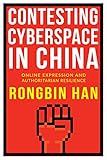Contesting Cyberspace in China : Online Expression and Authoritarian Resilience / Rongbin Han.
Material type: TextPublisher: New York, NY : Columbia University Press, [2018]Copyright date: ©2018Description: 1 online resource : 12 pieces of artContent type:
TextPublisher: New York, NY : Columbia University Press, [2018]Copyright date: ©2018Description: 1 online resource : 12 pieces of artContent type: - 9780231184748
- 9780231545655
- Authoritarianism -- China
- Authoritarianism -- China
- Authoritarianism
- Censorship -- China
- Censorship -- China
- Censorship
- Freedom of speech -- China
- Freedom of speech -- China
- Freedom of speech
- Internet -- Government policy -- China
- Internet -- Government policy -- China
- Internet -- Government policy
- Internet -- Political aspects -- China
- Internet -- Political aspects -- China
- POLITICAL SCIENCE / International Relations / General
- 302.2310951 23
- HN740.Z9 I567434 2018
- HN740.Z9
- online - DeGruyter
- Issued also in print.
| Item type | Current library | Call number | URL | Status | Notes | Barcode | |
|---|---|---|---|---|---|---|---|
 eBook
eBook
|
Biblioteca "Angelicum" Pont. Univ. S.Tommaso d'Aquino Nuvola online | online - DeGruyter (Browse shelf(Opens below)) | Online access | Not for loan (Accesso limitato) | Accesso per gli utenti autorizzati / Access for authorized users | (dgr)9780231545655 |
Frontmatter -- Contents -- Preface -- 1. Introduction: Pluralism and Cyberpolitics in China -- 2. Harmonizing the Internet: State Control Over Online Expression -- 3. To Comply or to Resist? The Intermediaries' Dilemma -- 4. Pop Activism: Playful Netizens in Cyberpolitics -- 5. Trolling for the Party: State-Sponsored Internet Commentators -- 6. Manufacturing Distrust: Online Political Opposition and Its Backlash -- 7. Defending the Regime: The "Voluntary Fifty-Cent Army" -- 8. Authoritarian Resilience Online: Mismatched Capacity, Miscalculated Threat -- Appendix -- Notes -- Bibliography -- Index
restricted access online access with authorization star
http://purl.org/coar/access_right/c_16ec
The Internet was supposed to be an antidote to authoritarianism. It can enable citizens to express themselves freely and organize outside state control. Yet while online activity has helped challenge authoritarian rule in some cases, other regimes have endured: no movement comparable to the Arab Spring has arisen in China. In Contesting Cyberspace in China, Rongbin Han offers a powerful counterintuitive explanation for the survival of the world's largest authoritarian regime in the digital age.Han reveals the complex internal dynamics of online expression in China, showing how the state, service providers, and netizens negotiate the limits of discourse. He finds that state censorship has conditioned online expression, yet has failed to bring it under control. However, Han also finds that freer expression may work to the advantage of the regime because its critics are not the only ones empowered: the Internet has proved less threatening than expected due to the multiplicity of beliefs, identities, and values online. State-sponsored and spontaneous pro-government commenters have turned out to be a major presence on the Chinese internet, denigrating dissenters and barraging oppositional voices. Han explores the recruitment, training, and behavior of hired commenters, the "fifty-cent army," as well as group identity formation among nationalistic Internet posters who see themselves as patriots defending China against online saboteurs. Drawing on a rich set of data collected through interviews, participant observation, and long-term online ethnography, as well as official reports and state directives, Contesting Cyberspace in China interrogates our assumptions about authoritarian resilience and the democratizing power of the Internet.
Issued also in print.
Mode of access: Internet via World Wide Web.
In English.
Description based on online resource; title from PDF title page (publisher's Web site, viewed 29. Mrz 2022)


